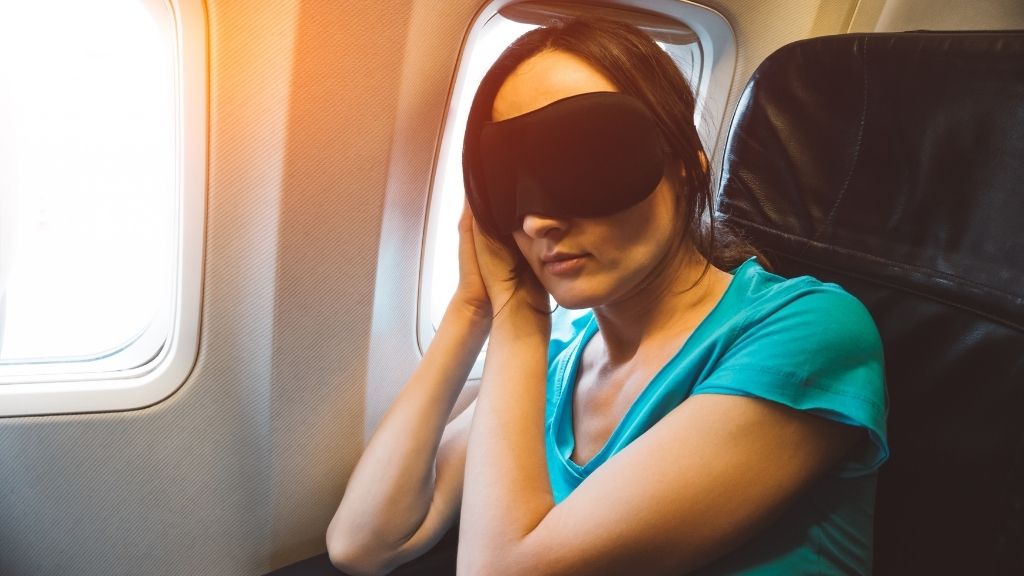How To Cope With Jet Lag And Insomnia (Symptoms, Causes And Tips)

Have you ever been extremely excited for an abroad trip, only to be extremely sleepy for the first couple days of your vacation? Jet Lag is real and can be a bummer to your plans, whether it is to have a productive vacation or to spring back to work when you’re back from a trip. Read this article for answers to questions like “What is Jet Lag and Insomnia?”, “How to Avoid Jet Lag?”, etc.!
Jet Lag is tiredness brought upon by traveling across different time zones. Jet Lag can be a group of symptoms, ranging from
- day-time sleeping,
- night-time sleeplessness,
- cognitive and physiological impairment, etc.
These symptoms may lead to bad experiences for you. [1]
Jet Lag or “time zone change syndrome” occurs when one travels from one-time zone to another rather abruptly. Sometimes, jet lag can also lead to a more serious form of sleep impairment called a jet lag disorder.
Insomnia is a very common sleep disorder that is prevalent in a lot of people today. With Insomnia, symptoms that are common are
- trouble falling asleep,
- trouble staying asleep,
- waking up early,
- being sleepy even after waking up, etc.
Jetting across time zones can mess with your body’s internal clock thereby making you sleep deprived (insomnia). Jet lag and insomnia can be managed with tips like exposing yourself to sunlight, limiting caffeine, and mimicking your original sleep schedule. What else can help deal with jet lag and insomnia? Read on.
|
DID YOU KNOW? Our body has an internal 24-hour clock that is called the circadian rhythm. It regulates the sleep-wake cycle and repeats roughly every 24 hours. |
What is Jet Lag?
Jet Lag or “time zone change syndrome” occurs when you travel from one time zone to another rather abruptly.
Your body is on schedule and produces neurotransmitters, for eg. melatonin, so that you fall asleep at night and wake up when the sun rises. The secretion of these hormones and neurotransmitters is synchronized to a 24-hour body clock. Many bodily processes like temperatures, digestion, hormone secretion, heart rate, and blood pressure are timed on this body clock that is also called the circadian rhythm.
When you travel to a different time zone, the circadian rhythm is disrupted. This causes the symptoms that lead up to jet lag. Not sleeping well before or after traveling to different time zones can worsen your jet lag. You are also at risk for jet lag disorder when you travel from one time zone to another.
The symptoms of Jet Lag may also include
- Irritability
- Memory lapses
- Fatigue
- Digestion problems
- Sleepiness
- Sleeplessness
- Impaired judgment
- Poor decision making
What is Insomnia?
The very common sleep disorder that we see in most people today is Insomnia. Insomnia messes up with sleep schedules in such a way that a basic lifestyle may seem inconvenient at times. Insomniacs have a tendency to be
- Irritable, depressed, anxious,
- Erratic and clumsy,
- Worried about sleep, etc.
Insomnia has a number of various causes that are often linked to the lifestyles led by insomniacs. They can range from:
- unhealthy eating habits,
- Irregular sleep patterns,
- mental illnesses,
- effects of medicine,
- intake of caffeine, alcohol or tobacco, etc.
How are Jet Lag and Insomnia related?
Air travel across time zones and disruption of circadian rhythm may lead to acute-sleep problems, reduced attention span, and impaired memory processing. Moreover, misalignment of the circadian rhythm may also lead to JLD or Jet Lag Disorder which is often common in travelers across different time zones. [1] [2]
The Jet Lag Disorder may cause acute insomnia and other symptoms.
Causes for Insomnia also include traveling from one time zone to another, upsetting the circadian rhythm, etc. Travel and work schedules may be stressful and expect employees to work despite jet lag. This may trigger jet lag disorder which may lead to an acute insomnia disorder, which again can worsen into a chronic insomnia disorder. [3]
What are some alternate cases that lead to Jet Lag?
Research has shown that flying across time zones may not be the only reason that causes Jet Lag. Atmospheric Pressure also has an effect on the human body and messes with the circadian rhythm of our body. Altitudes and Cabin Pressure tend to affect our body-clock adversely. They may contribute to some symptoms of Jet Lag.
Furthermore, high altitudes lead to low levels of humidity. A low humidity count tends to make you dehydrated. This in turn contributes to the symptoms of Jet Lag in human beings.
What increases the risk for Jet Lag?
Jet Lag cannot necessarily be avoided, but we can at least try to understand the effects of Jet Lag. Here’s what you should be aware of that may increase the risk for Jet Lag.
- Being old in age. Those old in age struggle with adjusting their circadian rhythm easily and hence experience with increased risk of Jet Lag.
- Flying across time zones very frequently. Those who fly from one time zone to another very often are at increased risk of Jet Lag and Insomnia.
- Flying in the eastward direction. When one flies towards the east, they lose their hours. This may mean reduced sleep and fatigue which may lead to an increased risk of Jet Lag in comparison to westward flying, which causes a gain in time.
How to keep Jet Lag in Control?
A jet lag can last anywhere from a couple of days to a couple of weeks. It depends from person to person. It is very essential that a person with Jet lag is resting well.
Although Jet Lag cannot be avoided, it can be kept in your control by following some small steps.
Keeping Jet Lag in Control on the flight:
- Be well rested and get some good sleep before departing to your destination.
- Be sure to avoid alcohol, caffeine, and tobacco during your travel.
- Make sure to wear earplugs and eye masks during your flight so as to get enough sleep and stay well-rested.
- Be comfortably dressed, preferably loose and warm clothing.
- Drink ample amounts of water to prevent dehydration.
- Eat meals that are light– for example fruits, vegetables, liquids, etc. Make sure to eat little quantities in small intervals.
Keeping Jet Lag in Control when you reach your destination:
- Try to mimic your original sleep schedule.
- Be sure to go out in the sun so that your body can acclimatize itself to the days and nights of the new time zone.
- Drink caffeine in moderation.
- Expose yourself to sunlight to induce melatonin production accurately.
Sleep Tips to Help Get Over Jet Lag:
There are only a number of things you can do to control your Jet Lag. It is a bodily response and there is not much you can do to change your body’s behavior.
- You can generally learn to follow a proper sleep schedule so as to keep your circadian rhythm in check.
- You can take hormone supplements like melatonin to induce sleep and get a good night’s sleep. How long melatonin lasts depends on whether melatonin is taken on an empty stomach, your body composition, and other such factors. Always check with your doctor before taking any supplements.
When to see a doctor?
Jet Lag can last anywhere from a couple of days to a couple of weeks, but when you are at high risk of Jet Lag and go through it every now and then, it is advisable to meet with a medical professional for help and aid.
FAQs
Can Jetlag cause Insomnia?
Jet Lag may cause effects in the body like disturbed sleep, insomnia, headaches, and nausea. The abrupt changes in your body’s clock can leave you with all the symptoms mentioned above.
How long does Jet Lag Insomnia last?
Jet Lag can last from a few days to several weeks. For how long Jet Lag lasts also depends on the number of time zones crossed, length of the trip, any medication is taken, your age, etc.
Why does Jetlag cause Insomnia?
When there is a sudden change in the body’s circadian rhythm or the body’s internal clock, effects like troubled sleep, insomnia are caused.
Which hormone can be tried to treat jet lag or insomnia?
Our body naturally produces melatonin to induce sleep. In the case of Jet Lag Insomnia, one can try melatonin supplements to treat insomnia.
Can Jetlag cause fever?
Most Jet Lag symptoms are mild with nausea, sleeplessness, and tiredness. Sometimes a mild fever may occur, but it is advisable to visit a doctor and get checked for a virus or flu.
Wrapping Up:
People face Jet Lag or Jet Lag Insomnia when they travel across time zones and upset their circadian rhythm. It may lead to side effects like nausea, sleeplessness, and more. There can be steps that one can take, before, during, and after their travel to minimize the effects of Jetlag or Insomnia.
References:
- Weingarten, Jeremy A, and Nancy A Collop. “Air travel: effects of sleep deprivation and jet lag.” Chest vol. 144,4 (2013): 1394-1401.
- Srinivasan, Venkatramanujam et al. “Jet lag, circadian rhythm sleep disturbances, and depression: the role of melatonin and its analogs.” Advances in therapy vol. 27,11 (2010): 796-813.
- “Insomnia – Symptoms and causes.” Mayo Clinic, 15 October 2016. Accessed 12 January 2022.







